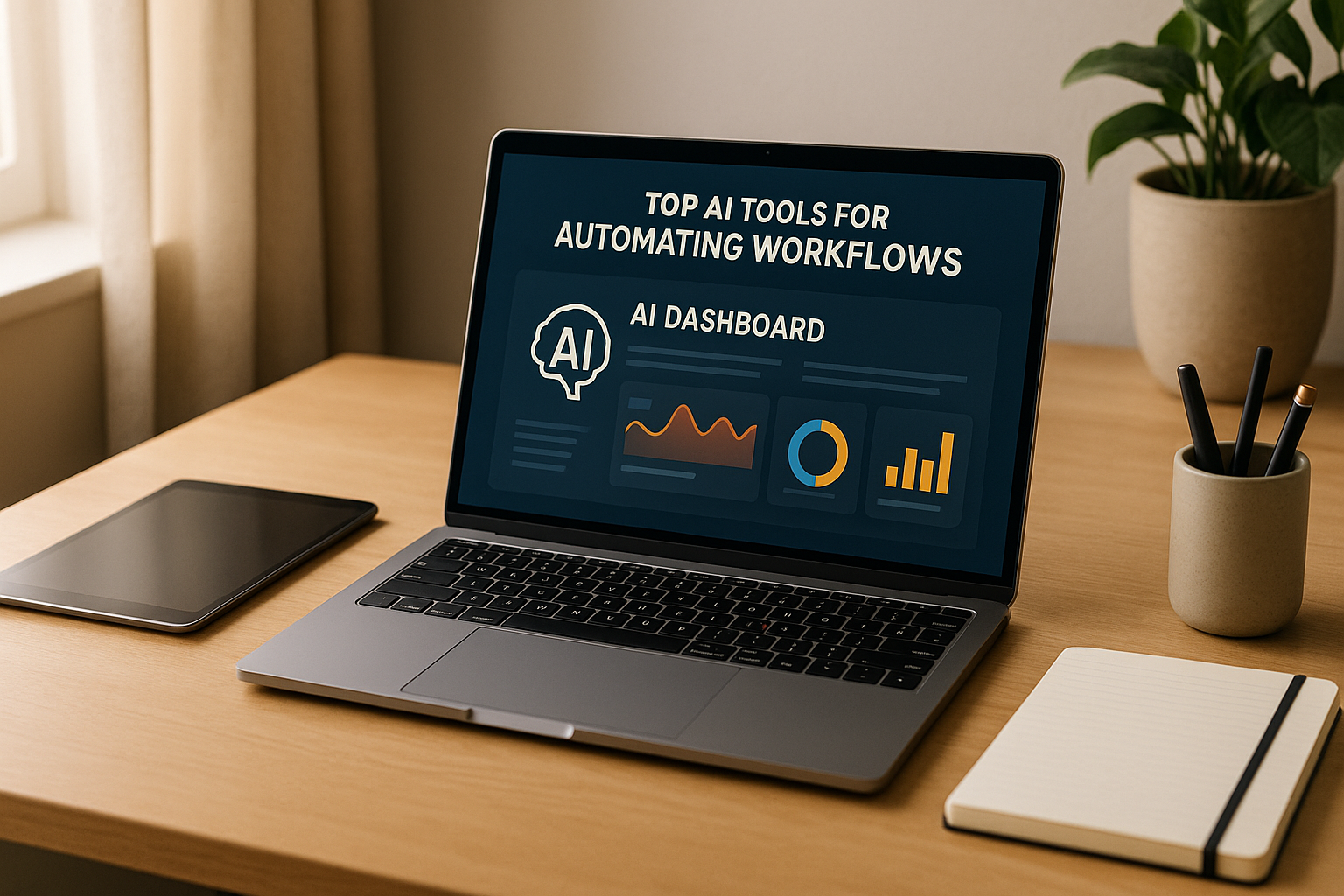
Automating workflows with AI is reshaping how businesses operate, cutting costs, and boosting efficiency. This guide highlights seven tools designed to simplify processes, reduce manual work, and integrate with existing systems. Whether you're managing projects, orchestrating AI models, or creating custom workflows, these tools cater to various needs and budgets.
| Tool | Key Features | Pricing (USD) | Integrations | Compliance |
|---|---|---|---|---|
| Prompts.ai | Access 35+ LLMs, FinOps, custom workflows | Free-$129/member/month | API integrations | Enterprise-grade security |
| Monday | Visual boards, automation recipes | $8-$24/seat/month | 200+ apps | SOC 2, GDPR |
| Jira Software | Agile tools, issue tracking | Free-$15.25/user/month | 3,000+ apps | SOC 2, ISO 27001, GDPR |
| Make | Visual scenario builder | Free-$16/month | 1,500+ apps | GDPR compliant |
| Gumloop | Drag-and-drop, AI workflows | $19-$49/month | 100+ integrations | Standard encryption |
| Lindy.ai | Conversational workflow creation | $29-$99/month | Email, CRM, productivity tools | Data encryption |
| Zapier AI | AI-driven no-code automation | Free-$49/month | 6,000+ apps | SOC 2, GDPR |
These tools simplify automation for businesses of all sizes, ensuring compliance, scalability, and cost transparency. Select the one that aligns with your operational needs and budget.
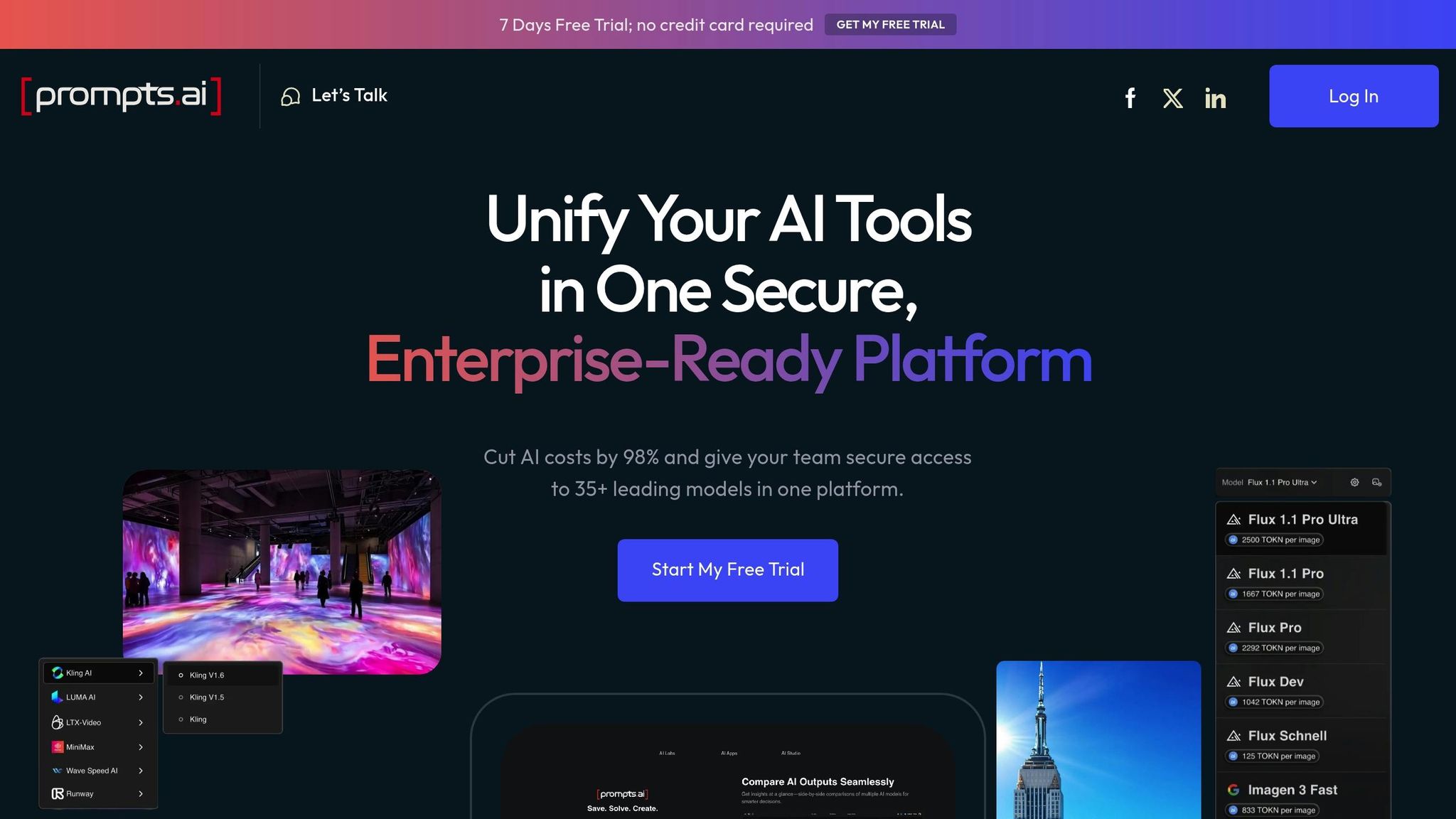
Prompts.ai is a powerful AI orchestration platform designed for enterprise use. It brings together over 35 leading language models - including GPT-4, Claude, LLaMA, and Gemini - into a single, secure interface. By doing so, it eliminates the hassle of juggling multiple subscriptions and significantly reduces costs for large organizations.
Prompts.ai simplifies AI workflow management by consolidating various AI tools into one unified system. This integration helps teams avoid the confusion of navigating multiple platforms, allowing them to focus on creativity and problem-solving. The platform's ability to integrate seamlessly with existing workflows makes it easier to customize processes to meet specific needs.
Prompts.ai makes building AI workflows accessible to everyone by offering "Time Savers" - ready-to-use prompt workflows designed by experts. Teams can implement these workflows quickly, saving time and effort. Additionally, the Prompt Engineer Certification program helps organizations develop in-house expertise, while its side-by-side model comparison feature enables informed decision-making based on data.
The platform prioritizes data security and governance, ensuring that sensitive business information stays within the organization’s control. With detailed audit trails documenting every interaction and granular user access controls, Prompts.ai meets the strict security requirements of regulated industries. This allows organizations to deploy AI responsibly while maintaining full oversight of their data.
Prompts.ai offers a straightforward, pay-as-you-go pricing model that aligns with actual usage. Its real-time FinOps layer tracks token consumption across all models, providing clear cost insights tied to business outcomes. For smaller teams or those just starting, personal plans are available at no cost, while business plans range from $99 to $129 per member per month. By consolidating access to premium AI models, the platform can cut AI software expenses by up to 98%, delivering enterprise-grade capabilities without the burden of managing multiple subscriptions.
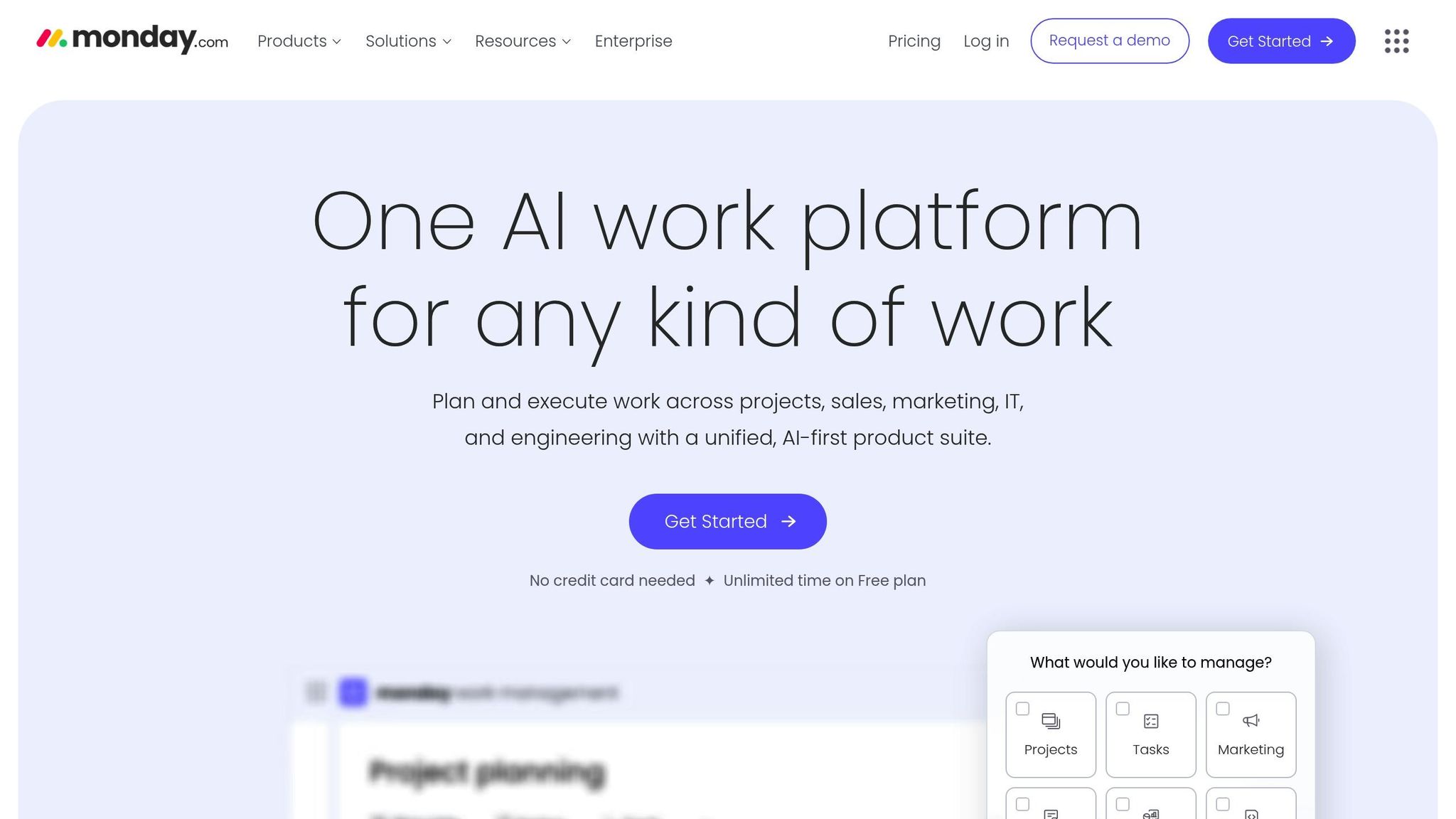
Monday Work Management is a project management platform designed to simplify workflows through AI-driven automation. It combines visual project tracking with intelligent tools to help teams across industries reduce manual tasks and improve coordination.
The platform's AI assistant streamlines routine activities like sending status updates, reminding teams of deadlines, and managing resource allocation. By analyzing project data, it can recommend efficient workflows and highlight potential bottlenecks before they become issues. Teams can set up automated triggers to move tasks through various stages based on predefined rules, ensuring smoother task progression and seamless integration with other business tools.
Monday Work Management integrates with over 200 third-party applications, thanks to its robust integration marketplace and API-first design that supports custom connections. It syncs effortlessly with popular tools like Slack, Microsoft Teams, Google Workspace, Salesforce, and HubSpot, creating a cohesive workflow environment.
Through Zapier, the platform connects to thousands more apps, while native integrations with tools like Jira and Asana make data migration and cross-platform collaboration straightforward. Automated syncing ensures that data remains up-to-date across all connected systems, eliminating the need for manual updates.
With its no-code workflow builder, Monday makes automation accessible to everyone, even those without technical expertise. Team members can create custom automations using simple if-then logic - for instance, automatically assigning tasks when project statuses change or sending alerts as deadlines approach.
The platform also features a template library with ready-made workflows for tasks like content creation, product launches, and client onboarding. These templates can be customized or used as inspiration to build workflows from scratch. Additionally, Monday's column types accommodate various data formats, such as timelines, budgets, file attachments, and progress tracking, allowing teams to tailor their boards to specific needs.
For advanced users, the Formula Column feature enables complex calculations and conditional formatting that adapt automatically to project data changes. These customization tools complement the platform's wide range of integrations.
Monday Work Management adheres to rigorous security standards, holding SOC 2 Type II certification and meeting GDPR compliance. The platform includes detailed permission settings to control access to sensitive data based on user roles.
Governance tools like audit logs provide a full record of user actions and changes, offering clear visibility into project updates and access patterns. The platform also supports single sign-on (SSO) with providers like Okta and Azure Active Directory, simplifying user management while maintaining strong security protocols.
For organizations with heightened security needs, Monday includes options like IP restrictions and two-factor authentication to safeguard accounts and data.
Monday Work Management offers a straightforward per-seat pricing model, with annual rates starting at $8 per user for the Basic plan, $10 per user for Standard, $16 per user for Pro, and $24 per user for Enterprise. Monthly payment options are available at slightly higher rates.
A 14-day free trial allows teams to explore the platform's features before committing. For growing businesses, Monday provides flexible user scaling, with prorated billing adjustments to accommodate changes. The platform also includes a pricing calculator to help teams estimate costs based on their specific needs and team size.
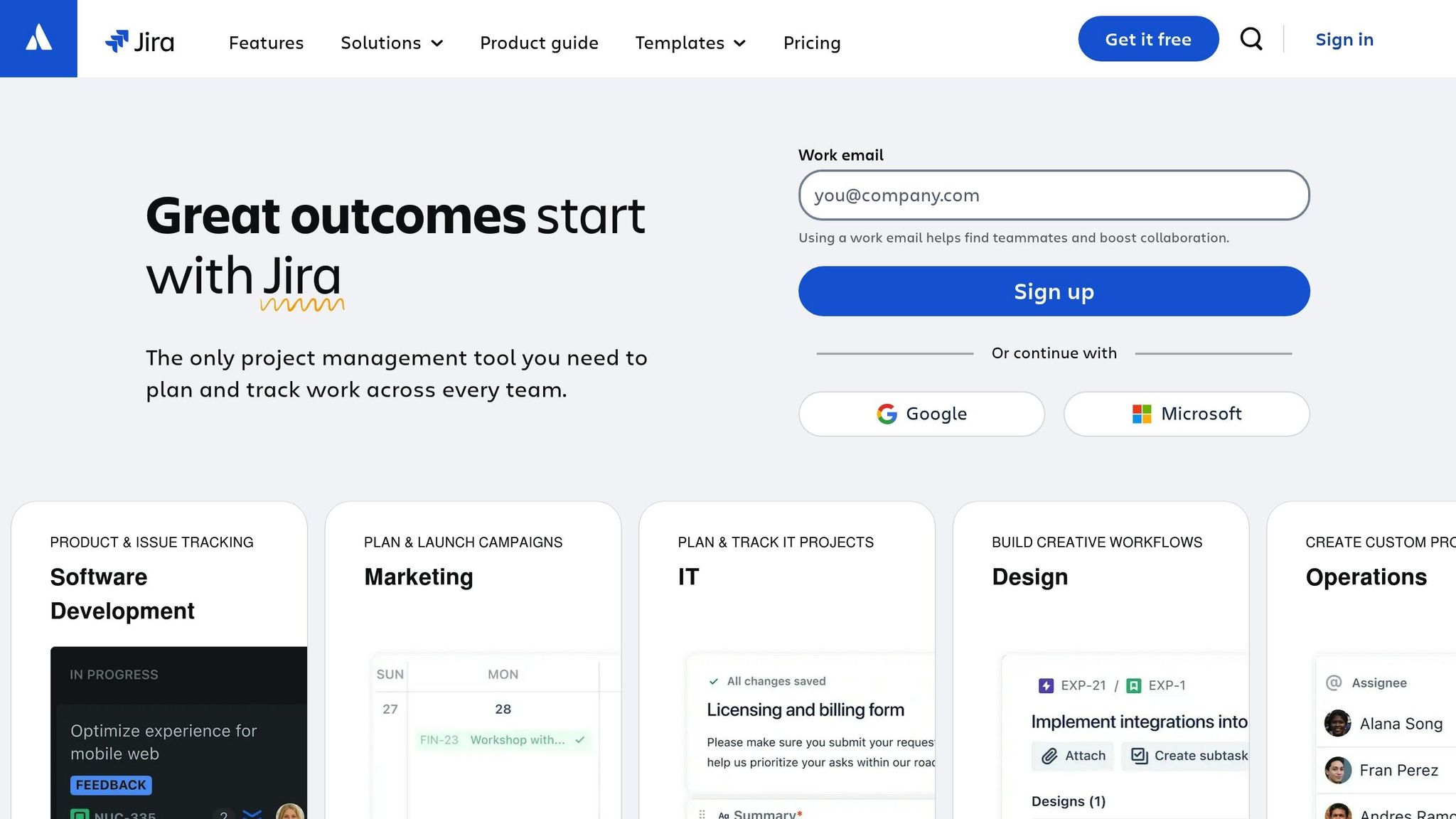
Jira Software serves as a versatile project management and issue tracking platform, designed to streamline workflows and improve team collaboration. While originally tailored for software development, it has evolved to support workflows across industries like marketing and manufacturing.
The platform simplifies repetitive tasks through automation. For example, its automation rules can assign tasks based on workload, escalate urgent issues, and notify stakeholders when key milestones are reached. Additionally, its query and reporting tools enable teams to create dynamic, role-specific dashboards. With seamless integration into existing systems, Jira enhances overall workflow efficiency.
Jira Software connects with a variety of development and business tools through the Atlassian Marketplace. For development teams, it integrates with platforms like GitHub, GitLab, Bitbucket, and Jenkins, enabling automated workflows across the development pipeline. On the business side, Jira works with collaboration tools such as Slack and Microsoft Teams, as well as customer relationship management (CRM) systems. It also pairs with Confluence to create a unified knowledge-sharing environment and supports integration with design and project management tools, ensuring continuity across workflows.
Jira’s flexibility extends to its customization options. It features a visual automation builder that allows non-technical users to create workflows effortlessly, while technical teams can leverage advanced scripting tools like ScriptRunner and Groovy. Teams can also define custom field types and issue types to fit their unique processes. Additionally, Jira offers a variety of project templates to support methodologies like Scrum, Kanban, and hybrid models, making it adaptable to different team needs.
Jira ensures enterprise-grade security with certifications such as SOC 2 Type II and ISO 27001. It includes robust audit logging, advanced permission settings, and support for data residency requirements. The platform also integrates with major single sign-on (SSO) solutions and provides tools to help organizations maintain GDPR compliance.
Jira uses a tiered, per-user pricing model with options for monthly or annual billing. Teams can take advantage of a free trial and a pricing calculator to estimate costs based on their size and required features, making it easier for businesses to budget effectively.
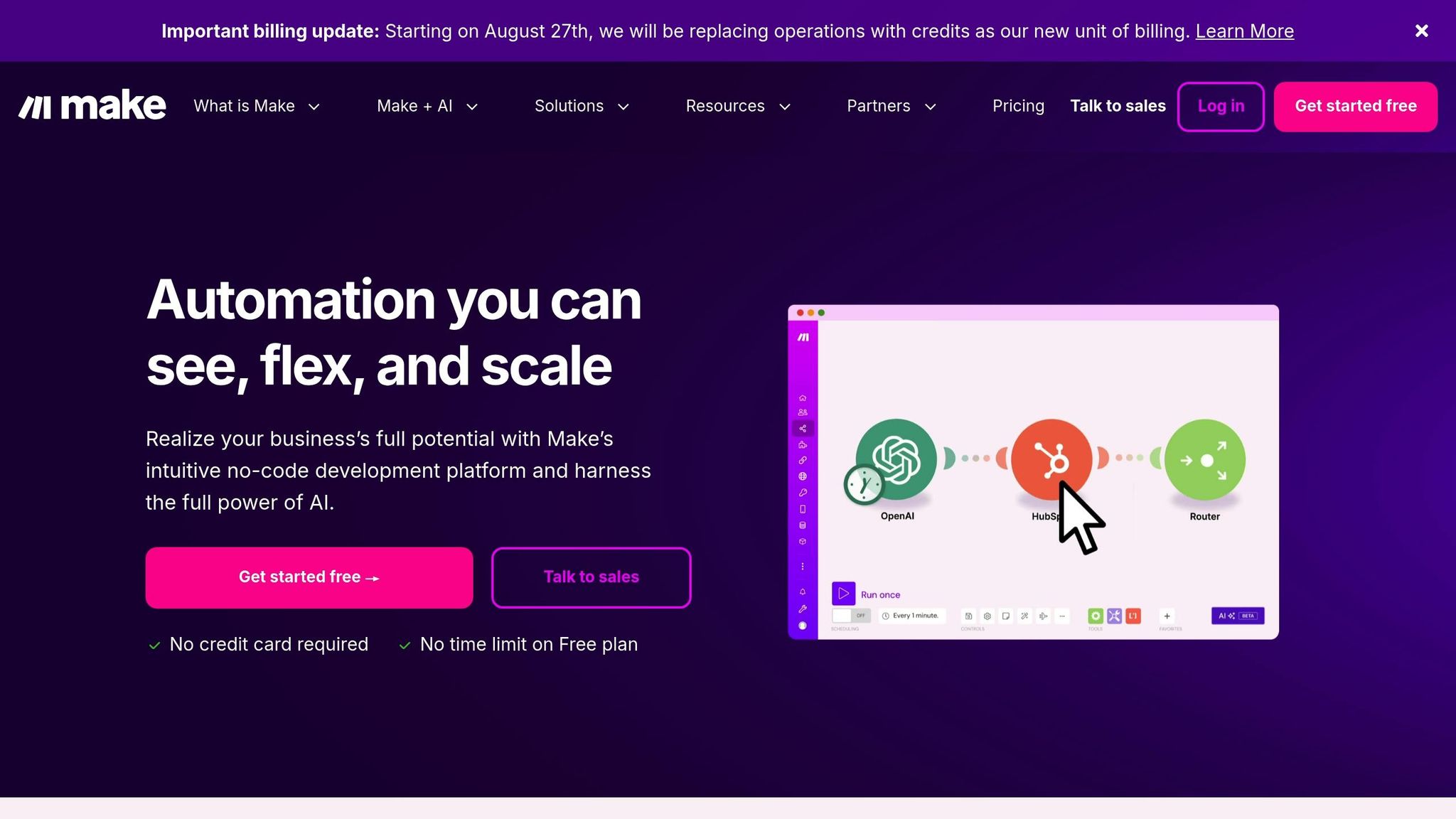
Make operates on a usage-based pricing system, where every module action is counted as one operation - this includes tasks like background polling for updates, which can add to usage more quickly than expected. The platform offers tiered plans designed to meet the needs of everyone, from individual users to large enterprises. Each plan is straightforward, with clearly outlined features and costs for every operation.
This pricing approach allows businesses to adjust seamlessly as their needs grow or change.
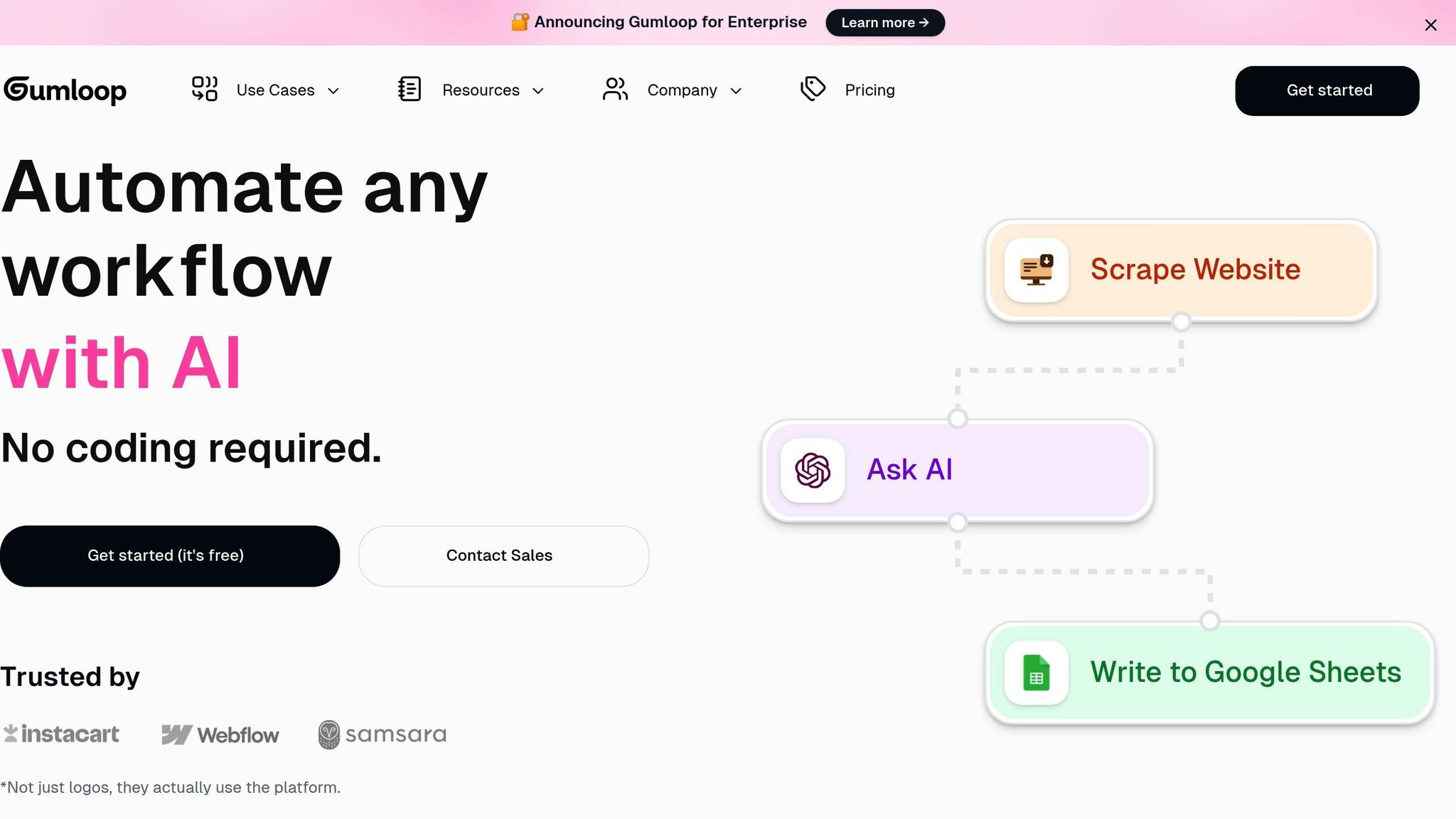
Gumloop is a no-code automation platform designed to help businesses streamline complex workflows without requiring programming expertise. It empowers users, especially those without technical backgrounds, to automate repetitive tasks using AI-driven solutions.
Gumloop’s drag-and-drop interface makes building automation workflows straightforward. Users can visually connect nodes to design processes that integrate AI models, handle data processing, and link with external services - all within a user-friendly visual editor. This intuitive setup removes the technical barriers that often prevent non-developers from creating their own automation solutions.
The platform supports custom AI model integration, enabling users to incorporate AI for tasks like text analysis, image recognition, and data extraction. By simplifying configuration, Gumloop allows users to leverage AI’s potential without needing deep technical knowledge.
Additionally, its workflow builder includes conditional logic and branching, which lets users create dynamic processes that adjust based on specific inputs or criteria. This flexibility opens the door to more advanced automation scenarios, all without requiring any coding skills.
Gumloop excels in interoperability, offering API connectivity to link workflows with a wide range of external applications. Whether pulling data from CRM systems, processing it through AI models, or sending results to other tools, the platform ensures smooth data flow. It supports REST API integrations and webhooks for real-time synchronization.
For added convenience, Gumloop provides pre-built connectors for popular business tools across sales, marketing, and operations. These connectors handle authentication and data formatting automatically, significantly reducing setup time and effort.
The platform also boasts file processing capabilities, enabling workflows to manage various data formats such as CSV files, PDFs, and images. This versatility makes it ideal for document-heavy workflows that span multiple departments and systems.
Gumloop uses a credit-based pricing model, where credits are consumed based on the computational complexity of each action. AI-powered tasks require more credits than simpler operations, giving businesses a clear and predictable cost structure tied to their usage.
The platform offers monthly subscription tiers tailored to different business sizes, ranging from individual users to large enterprise teams. Each plan includes a set credit allocation, with the flexibility to purchase additional credits as needed. This structure allows businesses to start small and expand their automation efforts over time without hefty upfront investments.
To help businesses manage costs effectively, Gumloop provides usage monitoring tools that break down credit consumption across workflows and time periods. These insights enable companies to track their ROI, fine-tune workflows, and maintain cost efficiency while achieving their automation goals.
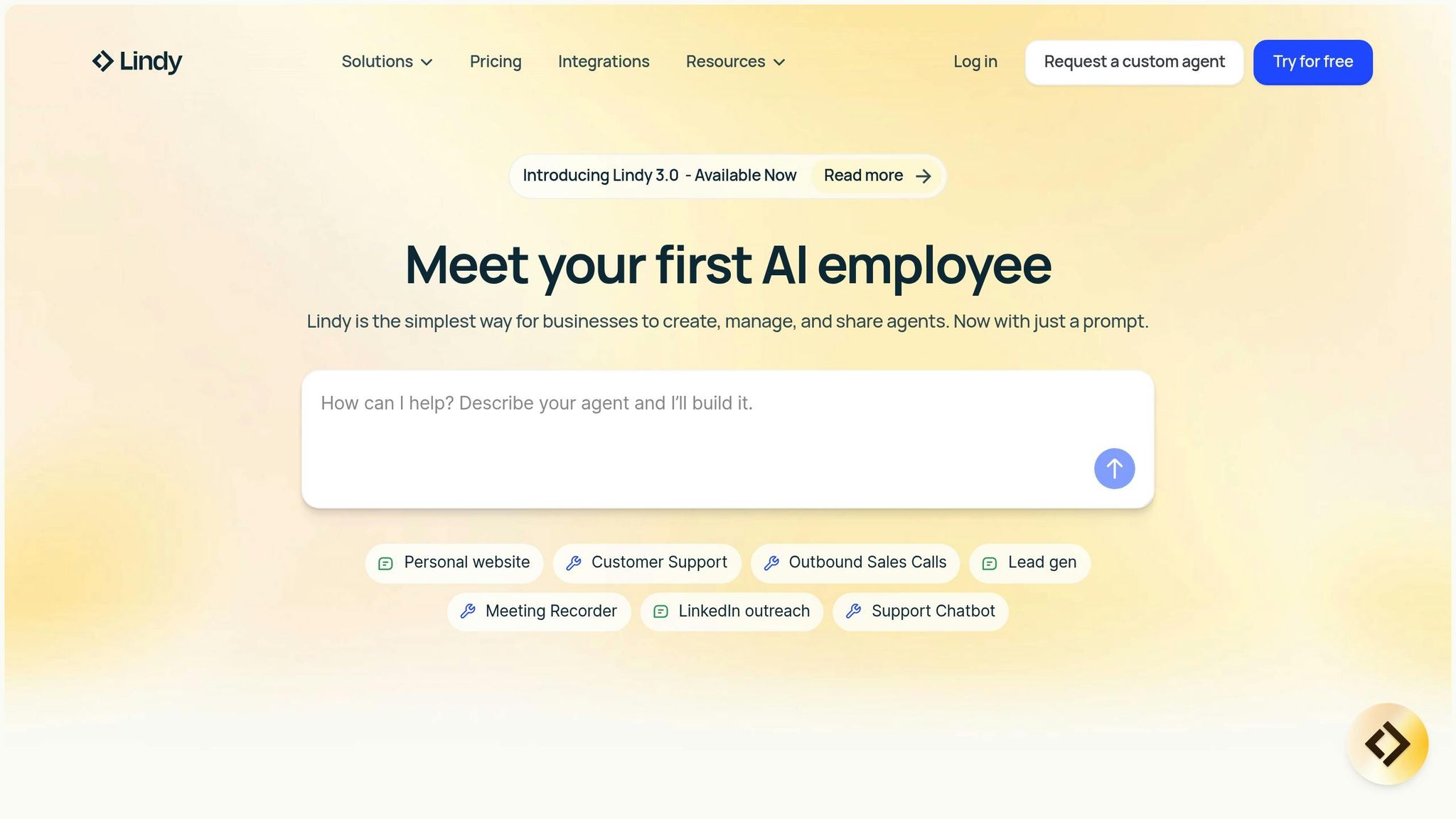
Lindy.ai is an AI-driven personal assistant designed to simplify workflow automation through natural language instructions. Unlike traditional platforms that require manual setup, Lindy.ai focuses on understanding user commands in plain language to create and execute automated processes across various business functions.
With Lindy.ai, users can describe their automation needs in everyday language, thanks to its conversational interface. For example, you might say, "Schedule follow-up emails for leads who haven’t responded", and Lindy.ai will translate that into a fully automated workflow.
What sets Lindy.ai apart is its ability to understand the context and intent behind requests. For instance, if you ask it to "generate a summary report of weekly sales data every Friday", the platform not only understands the task but also sets up the automation to ensure it happens consistently.
This natural, conversational approach eliminates the need for technical expertise. Users don’t have to learn complex software or workflow logic. Instead, they interact with Lindy.ai as they would with a human assistant, making it accessible for anyone, regardless of their technical background.
Lindy.ai connects effortlessly with key tools like email, CRM systems, project management software, and communication platforms through APIs. This allows it to coordinate actions across multiple platforms in real time. For example, it can monitor a Slack channel, update a CRM record, and send an email notification - all as part of a single workflow.
The platform ensures consistency throughout your tech stack by triggering actions in connected systems as soon as new data becomes available. This eliminates the need for manual updates, streamlining operations across your business tools.
Lindy.ai uses a transparent subscription model with usage-based billing, making it adaptable to businesses of all sizes. Enterprise plans include features like priority support, advanced security measures, and custom integrations, offering predictable monthly costs for U.S. companies.
For businesses with varying automation needs, the usage-based billing structure ensures they only pay for what they use. This makes Lindy.ai a cost-effective solution, whether you’re a small business exploring automation or a larger enterprise managing extensive workflows.
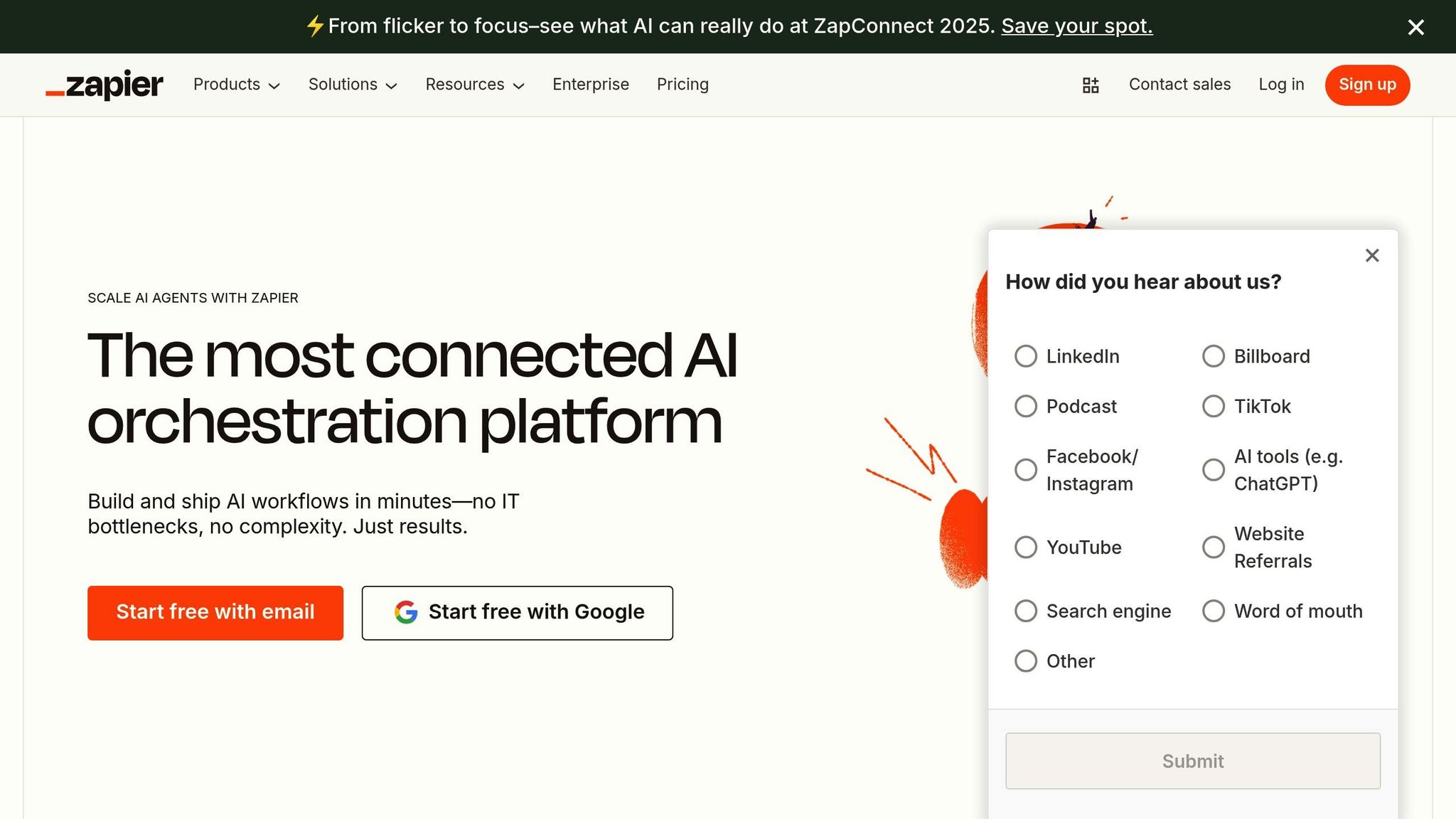
Zapier AI brings automation to the forefront by embedding AI capabilities directly into the Zapier platform. By analyzing user interactions and app data, it identifies ways to cut down on manual work and streamline workflows. Here's a closer look at how its standout features simplify automation.
Zapier AI connects with thousands of apps, creating a network that enables smooth data sharing and collaboration. Its intelligent tools automatically match data fields and set up integrations. For instance, when linking apps like Salesforce, Slack, and Google Sheets, the platform pinpoints shared data fields to ensure effortless transfers, making multi-platform workflows easier to manage.
With its no-code design, Zapier AI makes creating workflows accessible to everyone. Users can describe their automation goals in everyday language, and the platform transforms these into working solutions. Smart field mapping recognizes logical data connections automatically, while real-time suggestions help users choose the best triggers and actions for their needs, reducing setup time and complexity.
Designed with U.S. businesses in mind, Zapier AI uses a flexible, usage-based pricing structure. While specific rates may differ, the platform supports organizations of all sizes, from small startups to large corporations. Built-in analytics further enhance value by providing performance insights, helping businesses make informed, cost-efficient decisions about their automation strategies.
Choose the right AI workflow tool based on your specific needs, budget, and technical requirements. Below is a detailed side-by-side comparison of key features, pricing, and capabilities to guide your decision-making process.
| Tool | Key Features | Integrations | Pricing (USD) | Compliance | Customization |
|---|---|---|---|---|---|
| Prompts.ai | Access to 35+ LLMs, advanced cost controls (FinOps), enterprise governance, and prompt workflows | API connections to major platforms | Pay-as-you-go: $0/month Creator: $29/month Core: $99/member/month |
Enterprise-grade security, audit trails, and data governance | High - supports custom workflows, model selection, and prompt engineering |
| Monday Work Management | Visual project boards, time tracking, automation recipes, and team collaboration tools | 200+ app integrations, including Slack, Google Workspace, and Microsoft Teams | Basic: $8/seat/month Standard: $10/seat/month Pro: $16/seat/month |
SOC 2 Type II, ISO 27001, GDPR compliance | Medium - customizable dashboards and workflow templates |
| Jira Software | Issue tracking, agile project management, sprint planning, and bug tracking | 3,000+ apps via the Atlassian ecosystem | Free: Up to 10 users Standard: $7.75/user/month Premium: $15.25/user/month |
SOC 2, ISO 27001, GDPR, and HIPAA compliance | High - supports custom fields, workflows, issue types, and automation rules |
| Make | Visual scenario builder, real-time data processing, and error handling | 1,500+ apps and pre-built connectors | Free: 1,000 operations/month Core: $9/month Pro: $16/month |
GDPR compliant with data encryption and secure data centers | High - allows custom modules, advanced functions, and conditional logic |
| Gumloop | Drag-and-drop workflow builder, AI-powered automation, and multi-step processes | 100+ integrations with popular business tools | Starter: $19/month Professional: $49/month Enterprise: Custom pricing |
Standard encryption and secure API connections | Medium - visual workflow customization and trigger conditions |
| Lindy.ai | AI-powered personal assistant, natural language processing, and task automation | Integrates with email, calendar, CRM, and productivity tools | Basic: $29/month Pro: $99/month Enterprise: Custom pricing |
Data encryption and privacy-focused design | Medium - supports AI training, custom commands, and workflow preferences |
| Zapier AI | 6,000+ app connections, intelligent field mapping, and no-code automation | Largest integration ecosystem with automatic data matching | Free: 100 tasks/month Starter: $19.99/month Professional: $49/month |
SOC 2 Type II, GDPR compliance, and enterprise security | High - custom Zaps, advanced filters, and multi-step workflows |
AI workflow automation has become a key strategy for U.S. organizations striving to stay ahead in an increasingly competitive landscape. The seven tools discussed here highlight various approaches to automation, showing how they can address a range of operational needs.
A major takeaway is the importance of integration. Ensuring smooth connectivity with existing software systems allows companies to adopt automation without overhauling their entire infrastructure. This kind of adaptability ensures that automation efforts can coexist with current processes.
For U.S. companies navigating strict regulatory environments, enterprise-grade compliance is non-negotiable. Any automation tool must prioritize security and adherence to regulations to meet these demands effectively.
Transparent pricing structures are another critical factor. Hidden fees or unpredictable costs can undermine automation initiatives before they deliver results. Prompts.ai’s pay-as-you-go model offers a solution by aligning costs directly with usage, potentially slashing AI software expenses by up to 98%. This approach not only minimizes financial risk but also supports scalability as businesses grow.
Speaking of scalability, it’s essential that automation solutions grow alongside an organization. Platforms that can seamlessly incorporate new models, integrations, and team members without requiring extensive reconfiguration stand out as true enterprise-grade options.
As shown throughout this guide, the right automation tool does more than streamline tasks - it enhances overall efficiency. Whether your goal is to harness cutting-edge AI or to optimize existing processes, these tools can deliver measurable productivity gains and prepare your organization for the next wave of AI-driven advancements.
Prompts.ai empowers businesses to cut costs and simplify their workflows by automating repetitive tasks, minimizing manual errors, and accelerating routine operations. These improvements can translate into savings of up to 20–30% in operating costs and productivity gains exceeding 40%.
With around-the-clock functionality and enhanced task precision, Prompts.ai lets teams dedicate more time to strategic, high-impact work. This shift not only trims expenses but also amplifies overall performance, making it a smart choice for companies aiming to make the most of their resources while improving workflow efficiency.
When selecting an AI tool to automate workflows, it's essential to focus on factors that align with your business needs. Start by examining its integration capabilities - the tool should connect effortlessly with your current systems to avoid disruptions. Consider scalability as well, ensuring the solution can expand as your business grows. An intuitive interface and ease of use are equally important, allowing teams to adopt the tool without requiring extensive training.
Pay close attention to security and compliance, particularly if you'll be managing sensitive data. Assess the tool’s accuracy in delivering reliable results and its potential return on investment (ROI) to confirm it offers measurable benefits. Lastly, take into account the vendor's track record and the quality of their support services, as these can make a significant difference in maintaining a smooth and dependable experience.
AI tools that excel in integration can significantly enhance workflow automation by effortlessly linking different systems and applications. This connectivity empowers businesses to automate routine tasks, track processes in real time, and make quicker, data-informed decisions.
By working seamlessly with existing tools, these AI solutions help cut operational expenses, boost productivity, and streamline workflows. They also support ongoing improvements, enabling businesses to stay flexible and respond effectively to shifting needs.


